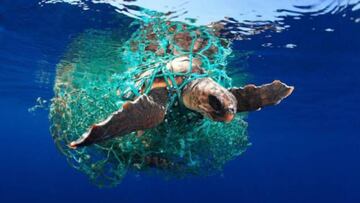Scientists create ‘living plastic’ that self-destructs
The problem of plastic pollution may have a new solution. Scientists have developed a biodegradable form of thermoplastic polyurethane that self-digests.

Plastic is one of the main elements that causes climate change and harms our planet. Over the years, scientists have developed models and systems to reduce its use or be able to reuse it, but now, a team of researchers has designed ‘living plastic’, a biodegradable material with bacteria integrated into it that has the ability to decompose at the end of its useful lifespan.
In this way, they seek to combat pollution when products containing these materials are thrown into the trash or discarded. As explained by the scientists in their study published by the journal Nature Communications, this “plastic” is composed of soft thermoplastic polyurethane, a material that can be used to make footwear, mats, cushions or memory foams.
Furthermore, thanks to the bacterial spores that are incorporated, when exposed to the nutrients present in compost, it germinates and decomposes this plastic material at the end of its life cycle. “It’s an inherent property of these bacteria,” explained one of the authors, Jon Pokorski, professor of nanoengineering at the University of California, San Diego.
Happy to share some of the fun things that we have been doing in collaboration with @FeistLab, @universityofga and @BASF! Using bacterial spores to break down polyurethanes. Congrats to a great team of people!@UCSDJacobs @SustainUCSD https://t.co/V9LVVky4RY
— Jon Pokorski (@pokorski_lab) April 30, 2024
Design and manufacturing
When developing this new plastic, the researchers introduced Bacillus subtilis spores and thermoplastic polyurethane granules into a pressing machine where both components were mixed and melted at 275ºF (135ºC). Subsequently, they evaluated the biodegradability of the resulting material by placing it on biologically active and sterile compost remains at 98.6ºF (37ºC), with a relative humidity of 44% to 55%.
Related stories
“Chances are, most of these plastics will likely not end up in microbially rich composting facilities,” Pokorski added in a statement. “So this ability to self-degrade in a microbe-free environment makes our technology more versatile.” The researchers have acknowledged that they have not yet studied the remains of the degraded material, but they believe that any lingering bacterial spores in it would likely be harmless.
“In conclusion, the incorporation of bacterial spores presents exciting opportunities for the introduction of living cells as renewable polymer fillers in industrial processes,” the researchers said. “This innovative approach combines evolutionary and genetic engineering methodologies and shows potential for diverse applications in the advancement of biocomposite materials.”


Complete your personal details to comment